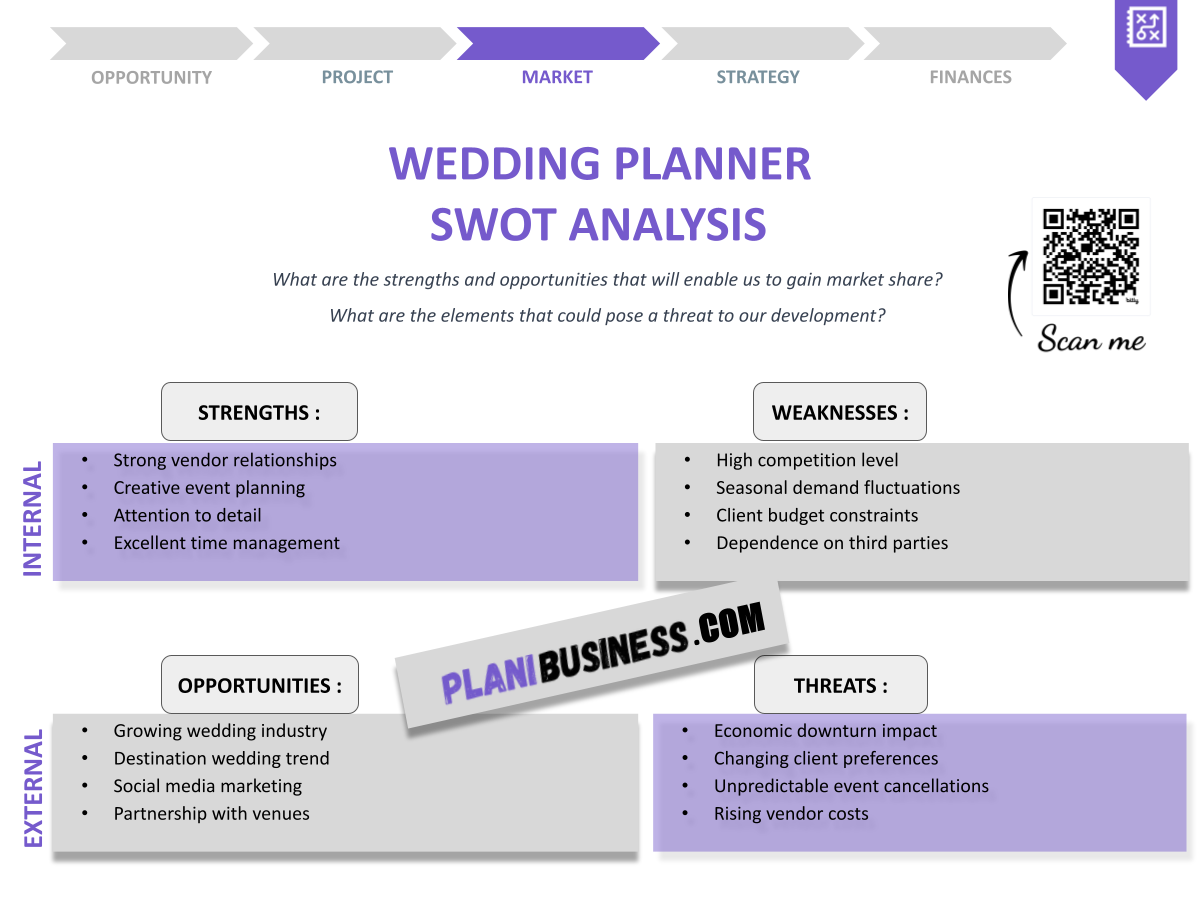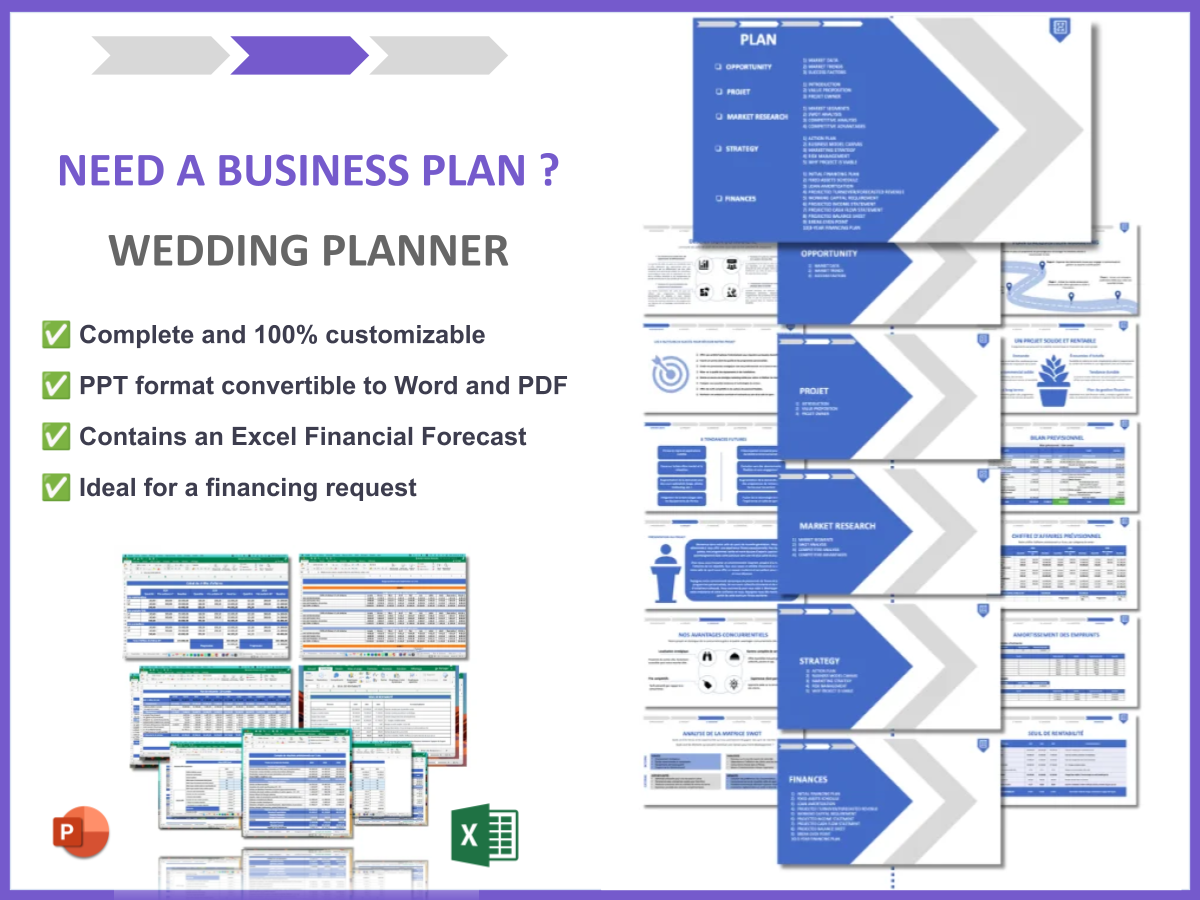Why Should You Have a SWOT Analysis for Wedding Planning?
Are you thinking about launching a wedding planning business? You’re not alone! The wedding industry is booming, with an estimated market size of over $72 billion in the U.S. alone. A SWOT analysis for wedding planners is crucial for understanding your position in this competitive market. It helps you identify your strengths, weaknesses, opportunities, and threats, allowing you to strategize effectively.
A SWOT analysis is a strategic planning tool that helps businesses identify internal strengths and weaknesses, as well as external opportunities and threats. This framework enables wedding planners to make informed decisions and enhance their services.
- Importance of SWOT analysis in wedding planning.
- How to identify strengths as a wedding planner.
- Recognizing weaknesses and areas for improvement.
- Exploring opportunities in the wedding industry.
- Understanding potential threats to your business.
- Real-world examples of successful SWOT analyses.
- Actionable strategies based on SWOT findings.
- The role of market trends in your SWOT analysis.
- How to implement changes based on your analysis.
- Final thoughts on the continuous use of SWOT in business strategy.
How Do You Write a SWOT Analysis for Wedding Planning?
Writing a SWOT analysis for your wedding planning business involves several steps. Start by gathering data about your business environment, then categorize your findings into strengths, weaknesses, opportunities, and threats.
Strengths
To identify your strengths, consider unique skills or experiences that set you apart as a wedding planner. Think about your network of vendors and suppliers that enhance your service offerings. Highlight positive client testimonials and successful past events. Explore your marketing strategies and brand recognition in the local market.
Weaknesses
Acknowledge areas where you lack experience or resources. Discuss challenges in your current client management or organizational processes. Identify gaps in your marketing or online presence. Reflect on customer feedback that highlights potential service improvements.
Opportunities
Explore new trends in wedding planning and how to leverage them. Discuss potential partnerships with local businesses or influencers. Identify market gaps that your services can fill. Highlight the benefits of expanding your service offerings or geographic reach.
Threats
Analyze competition within your market and their strategies. Discuss economic factors that could impact clients’ spending on weddings. Reflect on potential changes in consumer preferences or trends. Identify external factors such as regulations or industry standards that could pose challenges.
SWOT Example N°1 for Wedding Planning
Let’s look at a hypothetical wedding planning business and its SWOT analysis.
| SWOT | Analysis |
|---|---|
| Strengths | Experienced team with strong vendor relationships |
| Weaknesses | Limited online presence |
| Opportunities | Rising demand for eco-friendly weddings |
| Threats | Increasing competition from online planning services |
- Strong vendor relationships.
- Experienced team.
- Demand for eco-friendly services.
- Competitive online services.
By understanding these factors, this wedding planner can leverage strengths while addressing weaknesses and threats.
SWOT Example N°2 for Wedding Planning
Here’s another example showcasing a different wedding planning business.
| SWOT | Analysis |
|---|---|
| Strengths | Unique design approach |
| Weaknesses | Limited marketing budget |
| Opportunities | Growth in destination weddings |
| Threats | Economic downturn affecting spending |
- Unique design offerings.
- Strong client relationships.
- Growth in niche markets.
- Economic uncertainties.
This planner can focus on their unique designs to attract clients while seeking cost-effective marketing strategies.
SWOT Example N°3 for Wedding Planning
Examining a tech-savvy wedding planner’s SWOT analysis.
| SWOT | Analysis |
|---|---|
| Strengths | Strong social media presence |
| Weaknesses | Inexperience with large events |
| Opportunities | Increased interest in virtual weddings |
| Threats | Market saturation |
- Strong online engagement.
- Innovative approaches.
- Demand for virtual solutions.
- High competition.
Utilizing their social media skills can help this planner gain more visibility in a saturated market.
SWOT Example N°4 for Wedding Planning
A local wedding planner’s SWOT analysis.
| SWOT | Analysis |
|---|---|
| Strengths | Deep understanding of local market |
| Weaknesses | Limited portfolio |
| Opportunities | Collaboration with local venues |
| Threats | New entrants in the local market |
- Local market knowledge.
- Room for portfolio growth.
- Potential collaborations.
- Emerging competitors.
By collaborating with local venues, this planner can enhance their portfolio and strengthen their market position.
SWOT Example N°5 for Wedding Planning
Analyzing a wedding planner focused on cultural weddings.
| SWOT | Analysis |
|---|---|
| Strengths | Expertise in cultural traditions |
| Weaknesses | Niche market limitations |
| Opportunities | Increasing diversity in weddings |
| Threats | Cultural appropriation concerns |
- Cultural expertise.
- Niche market focus.
- Growing diversity.
- Ethical considerations.
Emphasizing their cultural expertise can help this planner capitalize on the growing diversity trend in weddings.
SWOT Example N°6 for Wedding Planning
A luxury wedding planner’s SWOT analysis.
| SWOT | Analysis |
|---|---|
| Strengths | High-end clientele |
| Weaknesses | High operational costs |
| Opportunities | Emerging luxury trends |
| Threats | Economic fluctuations |
- High-end service offerings.
- Cost management challenges.
- Luxury market growth.
- Economic impacts.
This planner can adapt to luxury trends to maintain relevance in a fluctuating market.
SWOT Example N°7 for Wedding Planning
Looking at a budget wedding planner’s SWOT analysis.
| SWOT | Analysis |
|---|---|
| Strengths | Cost-effective solutions |
| Weaknesses | Perceived quality issues |
| Opportunities | Demand for budget-friendly options |
| Threats | Stigma against budget services |
- Affordable services.
- Quality perceptions.
- Demand for budget options.
- Stigmas to overcome.
Focusing on quality service can help this planner change perceptions about budget offerings.
SWOT Example N°8 for Wedding Planning
A destination wedding planner’s SWOT analysis.
| SWOT | Analysis |
|---|---|
| Strengths | Unique locations offered |
| Weaknesses | Travel logistics challenges |
| Opportunities | Growing popularity of destination weddings |
| Threats | Travel restrictions |
- Unique offerings.
- Logistics complexities.
- Popular destination trend.
- Travel concerns.
This planner can capitalize on destination popularity while navigating travel challenges.
SWOT Example N°9 for Wedding Planning
Analyzing a wedding planner focused on elopements.
| SWOT | Analysis |
|---|---|
| Strengths | Specialization in intimate ceremonies |
| Weaknesses | Limited clientele base |
| Opportunities | Increasing interest in elopements |
| Threats | Competition from traditional planners |
- Intimate specialization.
- Client base limitations.
- Growing elopement interest.
- Traditional competition.
By marketing their niche, this planner can attract clients seeking unique, intimate experiences.
SWOT Example N°10 for Wedding Planning
A tech-focused wedding planner’s SWOT analysis.
| SWOT | Analysis |
|---|---|
| Strengths | Innovative tech solutions |
| Weaknesses | Reliance on technology |
| Opportunities | Growth in tech-savvy clientele |
| Threats | Rapid tech changes |
- Innovative offerings.
- Tech dependency.
- Tech-savvy demand.
- Industry changes.
Leveraging their tech solutions can help this planner stand out in a rapidly evolving market.
Conclusion
In summary, conducting a SWOT analysis for your wedding planning business is essential for navigating the competitive landscape. By understanding your strengths, weaknesses, opportunities, and threats, you can make informed decisions that enhance your services and attract more clients. Start your SWOT analysis today and unlock the potential of your wedding planning business!
If you are looking for a structured approach to your business strategy, consider using a comprehensive business plan template for Wedding Planner. This resource can help you lay out your vision and operational plan effectively.
Additionally, check out our articles on How to Set Up a Wedding Planner Business? and How to Build a Wedding Planner Marketing Plan? With Example for more insights and strategies to elevate your wedding planning services.
FAQ
1. What is a SWOT analysis?
A SWOT analysis is a strategic tool used to identify a business’s strengths, weaknesses, opportunities, and threats, helping planners develop effective strategies.
2. Why is a SWOT analysis important for wedding planners?
It assists wedding planners in understanding their market position and helps in crafting strategies to improve their services and competitiveness.
3. How frequently should a wedding planner conduct a SWOT analysis?
It’s advisable to perform a SWOT analysis at least once a year or whenever there are significant changes in the market.
4. Can a SWOT analysis assist with marketing strategies?
Absolutely! By identifying strengths and opportunities, planners can create targeted and effective marketing strategies.
5. What are common strengths for wedding planners?
Common strengths include strong vendor relationships, extensive experience, and unique service offerings that cater to various client needs.
6. What weaknesses might wedding planners face?
Weaknesses can include limited resources, lack of experience in certain niches, or a weak online presence that hinders visibility.
7. How can wedding planners identify opportunities?
Opportunities can be uncovered through thorough market research and analysis of current trends in the wedding industry.
8. What threats should wedding planners be aware of?
Threats can arise from economic downturns, increased competition, and changing consumer preferences that affect spending on weddings.
9. How do I implement changes based on my SWOT analysis?
Focus on leveraging your strengths and opportunities while addressing weaknesses and mitigating potential threats to enhance your overall business strategy.
10. Where can I find examples of successful SWOT analyses?
Many online resources provide case studies and examples of SWOT analyses across various industries, including wedding planning.







